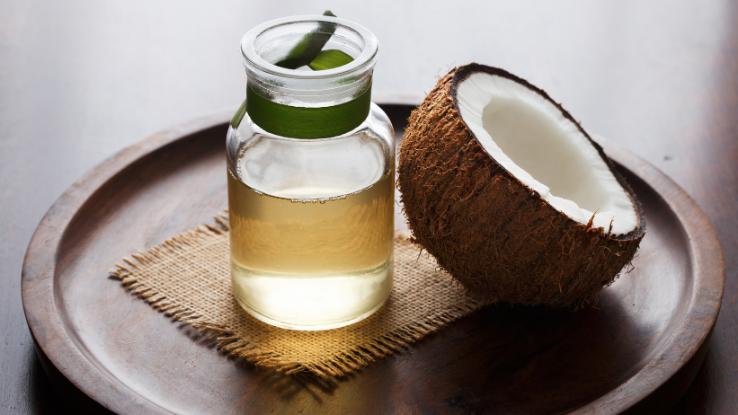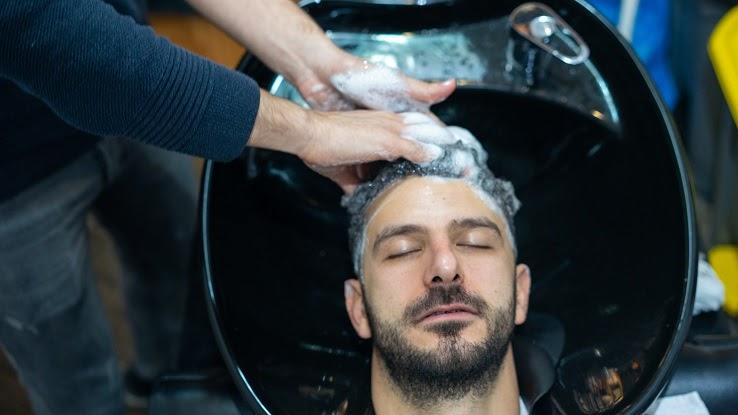Easy Hairstyles for Growing Out Bangs Hair

Coconut products seem to be the "it" trend right now, from coconut milk to coconut-based beauty products. And coconut oil is no exception. Initially touted as an alternative to traditional cooking oils, coconut oil soon gained popularity in the beauty industry too. While coconut-based skincare products seem to be all the rage, the beloved oil is being used in hair care regimens too. So, do coconut oil treatments lead to longer, healthier hair? Let's take a deep dive into the supposed benefits of coconut oil hair products.
Coconut oil has never been proven to make hair grow faster — in fact, there's really nothing that scientifically speeds up hair growth. After all, hair is the dead keratin cells that the body releases, and the body is always producing dead keratin, so, regardless of how it looks, your hair is actually always growing.

Without any outside intervention, the average person has six inches of new growth every year. Okay, so why doesn't everyone have a Rapunzel-length look? Unhealthy hair can break off, little by little, at a rate that can exceed the rate of growth. Plus, people shed hair every day. But length isn't the only measurement of healthy hair. Density — the ability to receive and retain moisture – and glossiness are also important factors to consider.
In the same way there's no elixir that can help you grow six inches taller, there's no way to speed up hair growth. However, increasing vitamin intake can address deficiencies that stunt growth. To this end, coconut oil can improve one's overall hair health.
Benefits of Using Coconut Oil on Your Hair and Scalp
Anti-fungal :

Coconut oil has anti-fungal properties. Scalp fungus is a pesky problem that can stifle length retention, irritate the scalp, and cause unsightly flakes. As terrible as it may sound, fungal growth on the scalp is not always easy to detect. Normal practices such as leaving the hair damp for too long can promote fungal growth. Coconut oil helps to address this hair growth hindrance at the root.
Conditioner and Detangler:
As beauty industry YouTubers can tell you, conditioners are often judged on their ability to provide "slip" (or viscosity). And what could be more "slippery" than oil? Thanks to its natural properties, coconut oil makes for a great conditioner and detangler. For example, coconut oil is high in lauric acid and fatty acids. Lauric acid protects the proteins that are naturally part of the hair follicle, allowing the oil to penetrate the hair, and provide nourishment, instead of just sitting on top of it.
Cuticle Heath:
When it comes to moisture, hair needs a perfect balance. If over-moisturized, hair can become weighed down and fragile, which is a big risk for folks who have high porosity hair. Additionally, coconut oil can act as a sealant, meaning it can help repair split ends.
Heat Protectant:
Coconut oil is full of fatty acids that help to seal the hair cuticle. Moreover, it has a smoke point of 350-400 degrees, depending on how refined it is. Since 400 degrees is close to most styling tools' upper limits, coconut oil seals each strand of hair in a substance that cannot burn, which makes it an amazing heat protectant.
How to Work Coconut Oil Into Your Beauty Regimen
Coconut oil is a white solid at room temperature. To reach its oil state, it requires a little bit of heat. By rubbing the hands together, body heat is often sufficient enough to melt a small chunk of coconut oil. This is also a great method of controlling how much oil is actually applied to the head.

For larger chunks of coconut oil, it may be easier to heat it in a microwave-safe bowl. The heating process should be gradual: Heat it for about 10 seconds, then check it to see if the oil is melted yet. You'll need to use the oil before it cools back down to room temperature, but you don't want to scald yourself either.
Coconut oil can be applied directly to the scalp or worked into the length of the hair. Since coconut oil is heavy, applying too much can weigh down one's hair and cause it to look (and feel) greasy. It is best to work with small amounts of coconut oil — after all, you can always add more if needed.
Another way to ensure an even application? Section your hair before applying the oil. However, if you're relying on coconut oil as a heat protectant, use it very sparingly: To avoid frying your hair, mix the coconut oil with water — either by dampening your hair before application or mixing in the oil and water in a spray bottle.
Allergy Concerns and More:
Coconut oil is comedogenic. In other words, it can clog pores and cause breakouts. This ingredient works wonders for many people, but just make sure you're not allergic to it. Some people with coconut allergies are only impacted by it topically, so don't think you're out of the woods just because you can safely eat coconut.
Resource Links:
- "Coconut Allergy" via Australasian Society of Clinical Immunology and Allergy
- "Cooking Oils and Smoke Points: What to Know and How to Choose the Right Cooking Oil" via MasterClass
- "In vitro Evaluation of Antifungal Activity of Virgin Coconut oil and White Palm Kernel Oil on Candida Species-Experimental Study" via Microbiology Research Journal International
- "What Is the Structure of Hair and How Does It Grow?" via NCBI
- "What Kids Should Know About How Hair Grows" via American Academy of Dermatology Association (AAD)
Source: https://www.symptomfind.com/beauty-wellness/coconut-oil-hair-grow?utm_content=params%3Ao%3D740013%26ad%3DdirN%26qo%3DserpIndex&ueid=758dec7f-60ba-4f44-8eaa-1f537db9dcd2
0 Response to "Easy Hairstyles for Growing Out Bangs Hair"
Post a Comment